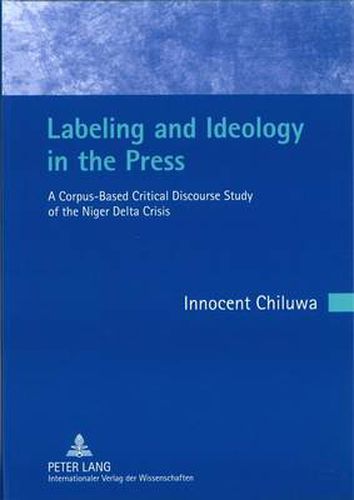Readings Newsletter
Become a Readings Member to make your shopping experience even easier.
Sign in or sign up for free!
You’re not far away from qualifying for FREE standard shipping within Australia
You’ve qualified for FREE standard shipping within Australia
The cart is loading…






This book examines the discursive construction of Nigeria’s Niger Delta ethnic militias in the Nigerian press. Over time, certain lexical items have been noted to occur frequently in the Nigerian press in representing the militia groups and their activities. This pattern of labeling which is often viewed as capable of causing further disaffection and conflicts produces a highly negative characterization of the key players in the crisis by consistently referring to them as ‘militants’, ‘thieves’, ‘cultists’, ‘criminals’, or ‘terrorists’. While some of these labels may appear to correctly represent the activities of some of the insurgents, the systematic focus of the press on one partial aspect of the ‘facts’ at the expense of perhaps more important aspects of the Niger Delta situation bears the danger of outwardly factual reporting of news turning into a vehicle for spreading half-truths and even propaganda. Media labels motivated by the intention to establish a cultural norm or social attitude around this group of social radicals or perhaps around the Niger Delta people in general, may therefore be viewed as evaluative judgement and ideological. Concordance and collocational tools are used to provide semantic profiles of the most frequently used labels in the corpus and, where appropriate, to offer quantitative proof of the presence of potentially distorted value judgements in the discourses under investigation.
$9.00 standard shipping within Australia
FREE standard shipping within Australia for orders over $100.00
Express & International shipping calculated at checkout
This book examines the discursive construction of Nigeria’s Niger Delta ethnic militias in the Nigerian press. Over time, certain lexical items have been noted to occur frequently in the Nigerian press in representing the militia groups and their activities. This pattern of labeling which is often viewed as capable of causing further disaffection and conflicts produces a highly negative characterization of the key players in the crisis by consistently referring to them as ‘militants’, ‘thieves’, ‘cultists’, ‘criminals’, or ‘terrorists’. While some of these labels may appear to correctly represent the activities of some of the insurgents, the systematic focus of the press on one partial aspect of the ‘facts’ at the expense of perhaps more important aspects of the Niger Delta situation bears the danger of outwardly factual reporting of news turning into a vehicle for spreading half-truths and even propaganda. Media labels motivated by the intention to establish a cultural norm or social attitude around this group of social radicals or perhaps around the Niger Delta people in general, may therefore be viewed as evaluative judgement and ideological. Concordance and collocational tools are used to provide semantic profiles of the most frequently used labels in the corpus and, where appropriate, to offer quantitative proof of the presence of potentially distorted value judgements in the discourses under investigation.